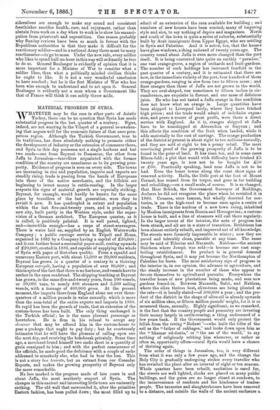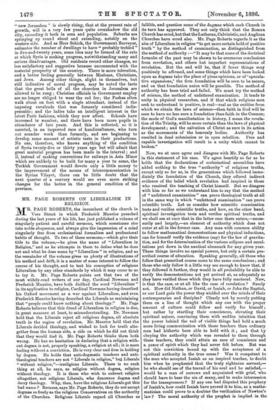MATERIAL PROGRESS IN SYRIA.
WHATEVER may be the case in other parts of Asiatic Turkey, there can be no question that Syria has made substantial progress in the last quarter of a century. Signs, indeed, are not wanting in the Vilayet of a general re-awaken- ing that augurs well for the economic future of that once pros- perous region. Although the Turkish Government, true to its traditions, has done absolutely nothing to promote either the development of industry or the extension of commerce there, and Syria to this day possesses not a single harbour and but two roads—one from Beyrout to Damascus, the other from Jaffa to Jerusalem—travellers acquainted with the former condition of the country are unanimous as to its growing pros- perity. Evidence of progress is seen on every side. The towns
are increasing in size and population, imports and exports are steadily rising, trade is passing from the hands of Europeans into those of the native merchants, and the fellahin are beginning to invest money in cattle-rearing. In the larger seaports the signs of material growth are especially striking.
Beyrout, for example, would hardly be known for the same place by travellers of the last generation, were they to revisit it now. It has quadrupled in extent and population within the last five-and-twenty years, and is practically a new city, built partly in the Western style, under the super- vision of a German architect. The European quarter, as it is called, is positively palatial. It is well paved, lighted, and—incredible enough—has a corps of street-scavengers. There is water laid on, supplied by an English Waterworks Company ; a public carriage service to Tripoli and Home, organised in 1882 by a Company having a capital of £20,000 ; and it can further boast a successful paper-mill, costing upwards of £20,000, erected in 1883, and capable of supplying the whole of Syria with paper of first-class quality-. From a squalid and unsavoury Eastern port, with about 15,000 or 20,000 residents, Beyrout has grown in a quarter of a century to a thriving European entrepot, having a population of over 80,000 ; and this in spite of the fact that there is no harbour, and vessels have to anchor in the open roadstead. The shipping touching at Beyrout has grown, in the same five-and-twenty years, from 100 vessels, or 30,000 tone, to nearly 400 steamers and 3,500 sailing vessels, with a tonnage of 400,000 gross. At the present moment, the imports there from England alone are over three- quarters of a million pounds in value annually, which is more than the sum-total of the entire exports and imports in 1860. So rapid has been the growth of trade, that an extension of the custom-house has been built. The only thing unchanged is the Turkish official ; he is the same pleasant personage as heretofore. He is firm in his refusal to accept any douceur that may be offered him in the custom-house to pass a package that ought to pay duty ; but he courteously intimates that he will have the pleasure of calling upon one the next day, and receiving the baksheesh privately. Some time ago, a merchant found himself two sacks short in a quantity of grain consigned to him ; and with the perfect concurrence of the officials, he made good the deficiency with a couple of sacks addressed to somebody else, who had to bear the loss. This is not a story ben trovato, but an extract from our Consular Reports, and makes the growing prosperity of Beyrout only the more remarkable.
No less marked is the progress made of late years in and about Jaffa, the most southerly seaport of Syria. The changes in this ancient and interesting little town are eminently striking. The old wall that surrounded it, after the primitive Eastern fashion, has been pulled dawn ; the moat filled up to
admit of an extension of the area available for building ; and numbers of new houses have been erected, many of imposing style and size, to say nothing of depots and magazines. North and south of the town is quite a series of suburbs, substantially built by Arab immigrants from Upper Egypt, who are settling in Syria and Palestine. And it is noted, too, that the houses have glass windows, a thing unheard of twenty years ago. The country round about Jaffa is even more changed than the port itself. It is being converted into quite an earthly " paradise," one vast orange-grove, a region of orchards and fruit-gardens. The number of such holdings has increased fourfold in the past quarter of a century, and it is estimated that there are now, in the immediate vicinity of the port, four hundred of these orange-gardens, ranging in size from two to fifteen acres ; and finer oranges than those of Jaffa are not grown in the world. They are oval-shaped, run sometimes to fifteen inches in cir- cumference, are exquisite in flavour, and one mass of delicious juice. He who has not tasted a Jaffa orange in fine condition does not know what an orange is. Large quantities have been shipped to Liverpool lately, where they have fetched high prices ; and the trade would admit of indefinite expan- sion, and prove a source of great profit, were there a direct service with England. As it is, oranges shipped at Jaffa have to be transhipped at Alexandria or Smyrna ; and this affects the condition of the fruit when landed, while it adds materially to the cost of carriage. The orange production of the district at present is about eight to ten millions annually, and they are sold at eight to ten a penny retail. The most convincing proof of the growing prosperity of Jaffa is to be found in the price of land. It has risen ten, and in some cases fifteen-fold ; a plot that would with difficulty have fetched £5 twenty years ago, is now not to be bought for £50 or £60. Practically speaking, land near Jaffa is not to be had. Even the lesser towns along the coast show signs of renewed activity. Haifa, the little port at the foot of Mount Carmel, has roused from its torpor, and gone in for building and rebuilding,—on a small scale, of course. It is so changed, that Herr Schick, the Government Surveyor of Buildings, declares he did not recognise the place when he revisited it in 1880. Caesarea, once famous, but wholly deserted for cen- turies, is on the high-road to become once again a centre of trade. There is the nucleus of a new town rising, inhabited by Moslem immigrants from Bosnia and Herzegovina; a custom- house is built, and a line of steamers will call there regularly. In the larger towns of the interior, the note of progress has been struck, and all are in a state of transition. Bethlehem has been almost entirely rebuilt, and improved out of all knowledge. The streets were formerly impassable in winter ; now they are paved and tolerably clean, passable at any time. The same may be said of Tiberias and Nazareth. Nablous—the ancient Shechem where Joseph was sold—is become one vast soap- boiling establishment. Its product is in general demand throughout Syria, and it may yet become the Northampton of Palestine for boots. The most satisfactory sign of progress in the interior is, in our opinion, the advance in agriculture, and the steady increase in the number of those who appear to devote themselves to agricultural pursuits. Everywhere the traveller hears of new plantations being made, and sees new gardens fenced-in. Between Nazareth, Safet, and Nablous, where the olive thrives best, olive-trees are being planted at the rate—it is locally stated—of 500,000 a year ; and the pro- duct of the district in the shape of olive-oil is already upwards of six million okes, or fifteen million pounds' weight, for it is so measured there, annually. Highly significant, as we remarked, is the fact that the country people and peasantry are investing their money largely in cattle-rearing, a thing undreamed of a few years back. If the Government would only protect the fellah from the roving " Bedawi "—who hails the tiller of the soil as the "father of cabbages," and looks down upon him as the " hhamar ed-dunia," or " the ass of the world," to say nothing of religiously robbing him whenever, or rather as often as, opportunity offers—rural Syria would have a chance of thriving again.
The order of things in Jerusalem, too, is very different from what it was only a few years ago, and the change the Holy City is gradually undergoing strikes every traveller who has revisited the place after an interval of eight or ten seasons. Whole quarters have been rebuilt, sanitation is cared for, the streets are well lighted, clocks are placed on many public buildings, and the gates are no longer closed at sundown, to the inconvenience of residents and the hindrance of trades- people. The tanneries and slaughterhouses have been removed to a distance, and outside the walls of the ancient enclosure a
" new Jerusalem " is slowly rising, that at the present rate of growth, will in a very few years quite overshadow the old city, exceeding it both in area and population. Suburbs are springing up round about and extending, notably on the western side. And as Herr Schick, the Government Surveyor, estimates the number of dwellings to have " probably trebled " in five-and-twenty years, some idea may be formed of the rate at which Syria is making progress, notwithstanding many and serious disadvantages. Old residents record other changes, no less satisfactory and suggestive because unconnected with the material prosperity of the country. There is more toleration, and a better feeling generally between Moslems, Christians, and Jews. Among other things, slight in themselves, but still indicative of moral progress, may be noted the facts that the great bells of all the churches in Jerusalem are allowed to be rung ; Christian officials in Government employ are no longer obliged to wear the red fez ; the Pashas often walk about on foot with a single attendant, instead of the imposing cavalcade that was formerly considered indis- pensable; and the ladies take an intelligent interest in the latest Paris fashions, which they now affect. Schools have increased in number, and there have been more pupils in attendance of late years. And this is reflected, so it is asserted, in an improved race of handicraftsmen, who turn out sounder work than formerly, and are beginning to develop some amount of artistic taste in their productions. No one, therefore, who knows anything of the condition of Syria twenty-five or thirty years ago but will admit that great material progress has been made in the interval ; and if, instead of making conventions for railways in Asia Minor which are unlikely to be built for many a year to come, the Turkish Government would devote only a little money to the improvement of the means of intercommunication in the Syrian Vilayet, there can be little doubt that the next quarter of a century would see even more striking changes for the better in the general condition of the province.















































 Previous page
Previous page